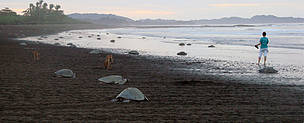Oversize fleets and shrinking tuna populations threaten health of Eastern Pacific Ocean, WWF warns
The fishing industry’s growing capacity to catch tuna in the Eastern Pacific Ocean is threatening populations of these species, WWF warned on August 22. As global leaders gather in southern California for the 93rd Meeting of the Inter-American Tropical Tuna Commission (IATTC) this week, WWF strongly urges member governments to reduce the amount of fish that vessels in the region can catch.

Eastern Pacific Ocean
In the last two decades substantial growth in fishing activity in the region has triggered unhealthy declines in important tuna species, bringing uncertainty for tens of thousands of people whose livelihoods depend on healthy stocks and ocean ecosystems. As tuna populations shrink, the window is rapidly closing for governments to rein in catches to protect the Pacific ocean’s complex ecosystems, the livelihoods and food security of local communities and to sustain an industry with ex-vessel revenue of US$1 billion annually.
“Everything hinges on the IATTC’s ability to bring fishing capacity in line with what the ocean can provide us, not just today but so there is a fishery into the future. There are still far too many boats chasing too few tuna in the Pacific and this cannot continue” said Pablo Guerrero, Fisheries Director, WWF-Ecuador.
“While there may be a long list of priorities for the commission, if governments fail to address the capacity of the purse seine fleet to catch tuna and take additional conservation measures, it will wipe out all of the other progress that has been made.”
According to information from industry, and from scientific studies, the fleet’s fishing capacity is almost double the IATTC’s suggested level (which is based on recommendations from IATTC scientists). The situation is further exacerbated as authorized vessels are scrapped and replaced by new vessels that are increasingly efficient at catching tuna, largely due to advancements in technology and technique.
“It is critical that commission members implement additional conservation measures for tropical tunas and finalize their plan to eliminate excess fishing capacity. As an incentive for member states, the commission should include measures rewarding member states for demonstrated reductions in fleet capacity,” Guerrero added.
One technique purse seine vessels have for catching tuna more efficiently is the use of fish aggregating devices (FADs). However, FADs increase the likelihood of fishing operations also entangling turtles, sharks and other non-target ocean wildlife, posing serious risks. In addition, if the FADs are lost, they risk becoming marine garbage, adding to the growing challenge of ocean pollution.
According to Guerrero, “the IATTC has taken steps to better manage FADs by putting limits on how many vessels can use them, as well as by adopting prototypes that reduce the entanglement threat to species like sharks and turtles. Industry has taken the lead on much of this work and it is a good start, but member governments need to agree on a strategy that ultimately leads to better management of FADs. We need a clear picture on how this fishing method is playing out in the Eastern Pacific and only governments working together in the region can accomplish that.”
WWF is calling for significant improvements in the collection and reporting of FAD data, greater technological innovation and a clear focus on substantially reducing the entanglement of threatened species like turtles and other ocean wildlife already under pressure such as sharks.
In addition, a position paper by WWF submitted to the IATTC ahead of the meeting also calls for measures to strengthen security for observers working on board tuna fishing vessels. There is near universal agreement amongst industry, governments and scientists that observers are a key part of fisheries management as they provide vital information about the operation of the fleet. A measure agreed to in the Western and Central Pacific in 2015 provides a model framework for ensuring that observers have basic equipment to ensure their safety while on board a fishing vessel, and WWF urges the IATTC to adopt a similar approach in the Eastern Pacific.
“There is tremendous energy for making the changes necessary in the Eastern Pacific to sustain ocean health, biodiversity and livelihoods for tens of thousands and it is leading to important collaborations. WWF hopes that this energy is used to forge agreement on these urgent issues at this meeting,” Guerrero said.
Source: World Wildlife Fund
- 267 reads
Human Rights
Fostering a More Humane World: The 28th Eurasian Economic Summi

Conscience, Hope, and Action: Keys to Global Peace and Sustainability

Ringing FOWPAL’s Peace Bell for the World:Nobel Peace Prize Laureates’ Visions and Actions

Protecting the World’s Cultural Diversity for a Sustainable Future

Puppet Show I International Friendship Day 2020

